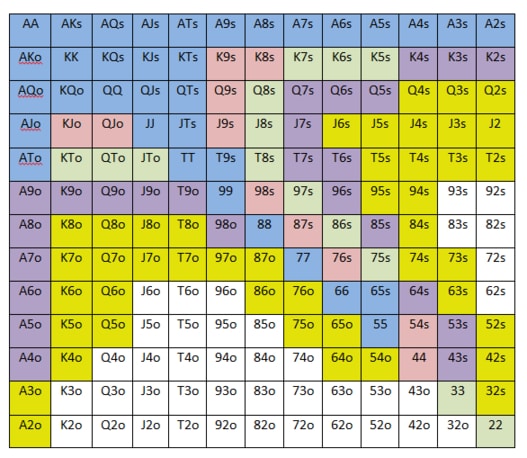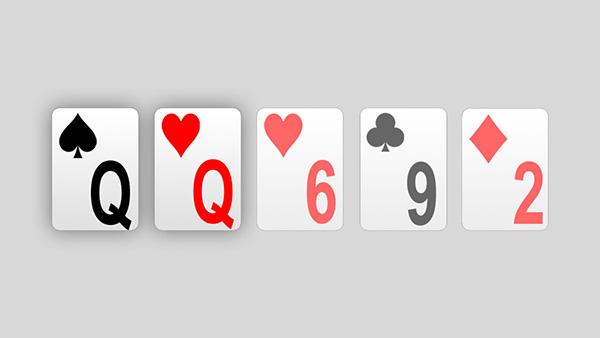Texas Hold'em Odds y Probabilidades responde a todas estas preguntas y a mas. Cada sencilla decision que toma en la mesa de poker esta relacionada de alguna manera con las odds y las probabilidades. Independientemente de que esta decidiendo apostar, igualar, retirarse, subir, o incluso farolear, las odds y las probabilidades forman una parte. Though psychology and luck should be given their due credits, poker is essentially a numbers game. By learning to perform basic calculations for hold'em odds, such as those outlined in this article, you will significantly increase your chances of winning. 'Holdem Indicator is a brilliant poker calculator that reports the information you need to make the right decisions in an easy-to-read format that's simple yet sophisticated. Online you don't have the time to calculate more than a fraction of the information HI gives you almost instantly.

Remember the last time you called with a pair of eights and were raised? Didn't you wonder whether your opponent had a bigger pair, or was simply raising with big connectors? When you're playing Texas Hold'em, you're always dealing odds. 'How many outs do I have?', 'Is the money I'll win if I call with my straight draw greater than the odds against making my hand?' These questions of poker strategy, all have mathematical components at their heart.

Some players are blessed with an intuitive sense about mathematical relationships - although they can't calculate them, or even do a rough approximation in the heat of battle. Most beginners, however, simply ignore this aspect of the game. Given the chance, even bright students are prone to avoiding mathematics, which is a shame because poker math is far from being difficult.
How Many Hands Are Rightfully Mine?
This is not a question that's asked frequently, but when you consider how many hands you should play before the flop, it's an important one for mastering your poker game. In a nine-handed game with randomly distributed cards, approximately 11% of the starting hands should favor you. That's simple, isn't it? But remember, that's not all there is to it, either. Hold'em, after all, is a game of position, and you'll probably play less than 11% of your hands in early position, and far more than 11% when you're last to act. Whether calling, folding, raising, or reraising, is your best option will also be influenced by the play of those opponents who act before you.
Try These Practice Exercises
How do you calculate the number of different two-card starting combinations that could be dealt?

There are 169 unique, two-card starting hands. Here's how to compute it. You can receive any one of 13 distinct ranks, from ace up through king, as your first or second card. All you need do, therefore, is multiply thirteen by thirteen to calculate the correct answer.
Although there are 169 different starting hands, it's also true that there are 1326 different two-card combinations. If you feel lost at this point, stop for a moment and let us explain. When you're considering 169 different starting hands, you have yet to see the flop, and it's meaningless at this early juncture to distinguish between hands like A♥Q♥ and A♣A♦
When you're considering the odds against certain combinations of holdings, it's usually necessary to deal with all of the 1326 different 2-card combinations. Here's why.
Suppose that the guy sitting next to you will raise only with aces, kings, or A-K. If you're holding a pair of queens, what are the chances you're already trailing?
Although the arithmetic isn't difficult, there are a number of components to this problem. The only hands better than a pair of queens at this point are a pair of aces or a pair of kings. Queens, after all, are stronger than A-K right now, since A-K has to improve on or after the flop in order to beat you. To solve Exercise 2, there are two additional problems you have to work out before you continue…

Remember the last time you called with a pair of eights and were raised? Didn't you wonder whether your opponent had a bigger pair, or was simply raising with big connectors? When you're playing Texas Hold'em, you're always dealing odds. 'How many outs do I have?', 'Is the money I'll win if I call with my straight draw greater than the odds against making my hand?' These questions of poker strategy, all have mathematical components at their heart.
Some players are blessed with an intuitive sense about mathematical relationships - although they can't calculate them, or even do a rough approximation in the heat of battle. Most beginners, however, simply ignore this aspect of the game. Given the chance, even bright students are prone to avoiding mathematics, which is a shame because poker math is far from being difficult.
How Many Hands Are Rightfully Mine?
This is not a question that's asked frequently, but when you consider how many hands you should play before the flop, it's an important one for mastering your poker game. In a nine-handed game with randomly distributed cards, approximately 11% of the starting hands should favor you. That's simple, isn't it? But remember, that's not all there is to it, either. Hold'em, after all, is a game of position, and you'll probably play less than 11% of your hands in early position, and far more than 11% when you're last to act. Whether calling, folding, raising, or reraising, is your best option will also be influenced by the play of those opponents who act before you.
Try These Practice Exercises
How do you calculate the number of different two-card starting combinations that could be dealt?
There are 169 unique, two-card starting hands. Here's how to compute it. You can receive any one of 13 distinct ranks, from ace up through king, as your first or second card. All you need do, therefore, is multiply thirteen by thirteen to calculate the correct answer.
Although there are 169 different starting hands, it's also true that there are 1326 different two-card combinations. If you feel lost at this point, stop for a moment and let us explain. When you're considering 169 different starting hands, you have yet to see the flop, and it's meaningless at this early juncture to distinguish between hands like A♥Q♥ and A♣A♦
When you're considering the odds against certain combinations of holdings, it's usually necessary to deal with all of the 1326 different 2-card combinations. Here's why.
Suppose that the guy sitting next to you will raise only with aces, kings, or A-K. If you're holding a pair of queens, what are the chances you're already trailing?
Although the arithmetic isn't difficult, there are a number of components to this problem. The only hands better than a pair of queens at this point are a pair of aces or a pair of kings. Queens, after all, are stronger than A-K right now, since A-K has to improve on or after the flop in order to beat you. To solve Exercise 2, there are two additional problems you have to work out before you continue…
How many different ways can you make a pair of aces or a pair of kings? How many ways can you make A-K?
There are only six ways to make aces - or any pair for that matter - but 16 ways to make A-K. Here are all the possible ways to make a pair of aces: A♠A♦, A♠A♣, A♠A♥, A♦A♣, A♦A♥, and A♥A♣. Just take the aces from any deck of cards and you'll be able to figure this out even if you don't know how to calculate the answer arithmetically.
If your opponent will raise only with A-K, a pair of aces, or a pair of kings, chances are greater that he raised with A-K, since there are 16 ways to make A-K but only 12 ways to make a pair of aces or a pair of kings!
You can do some other useful calculations with what you've learned thus far. For example, since there are 1326 possible 2-card combinations, but only six ways to make aces, try your hand at this problem.
Probabilidades No Poker Texas Holdem
What are the odds against being dealt a pair of aces before the flop?
All you have to do is divide 1,326 (the amount of 2-card combinations) by 6 (the potential amount of ace pairs) to figure this out. The answer, of course, is that you'll receive aces, on average, once every 221 hands.
Probabilidades Poker Holdem Card Game
You need to log in or create an account to post to this user's Wall.
Probabilidades poker texas holdem calculator, probabilidades poker texas holdem calculadora posted an update
CLICK HERE >>> Probabilidades poker texas holdem calculator
Probabilidades poker texas holdem calculator
This poker calculator…[Read more]Probabilidades poker texas holdem calculator, probabilidades poker texas holdem calculadora's profile was updated
Probabilidades poker texas holdem calculator, probabilidades poker texas holdem calculadora became a registered member
